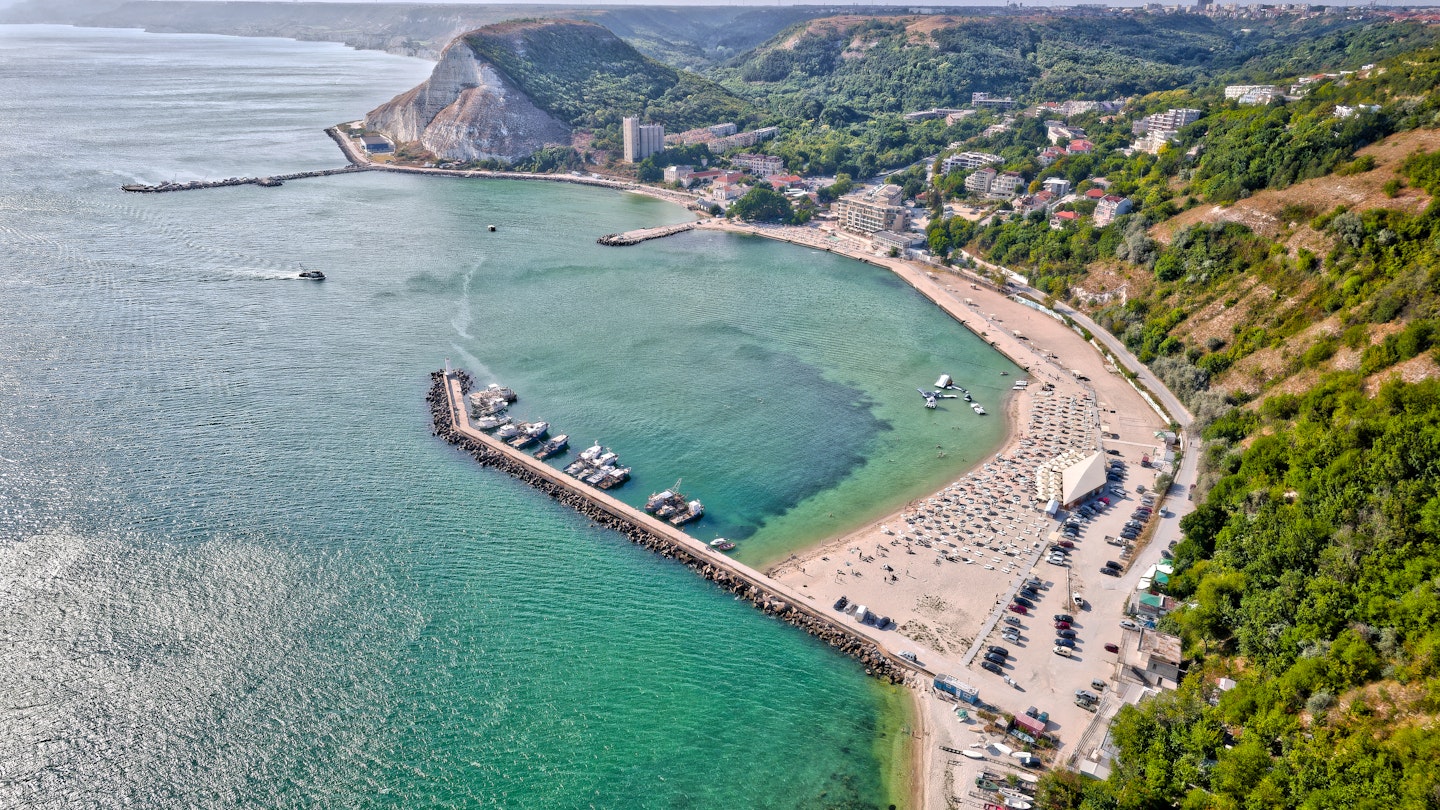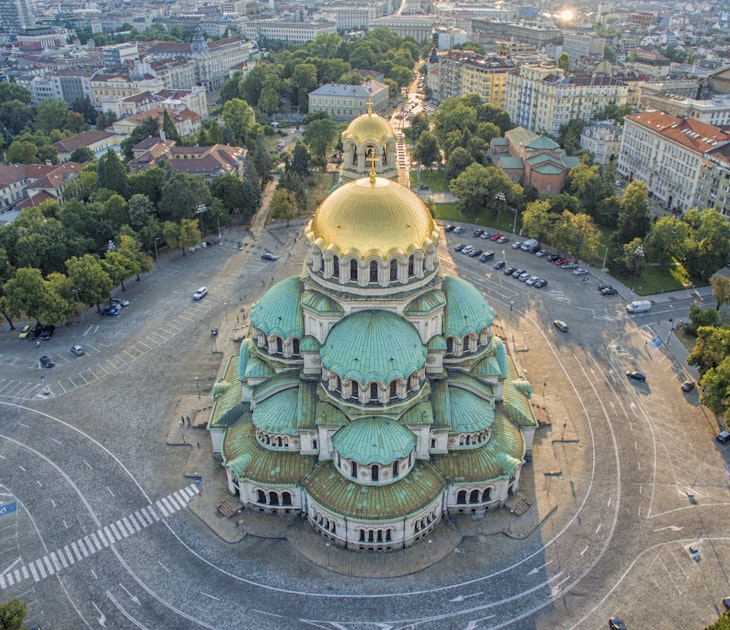

Visit in summer to unwind by the Black Sea in a beachside town like Kavarna (pictured), Burgas or Varna В© Cemal Mehmedov / 500px / Getty Images
Often an underrated destination, Bulgaria is one of the most affordable places to visit in Europe with stunning views and endless adventure opportunities.
Just a flight, train or bus away from most European capitals, Bulgaria truly has so much to offer. Proud of their rich heritage and long and challenging history, Bulgarians may appear grumpy at first glance, but don’t be fooled. The genuine hospitality and diversity of experiences is what makes the country worth a visit.
Whether you’re going for a long weekend or you want to spend a week or two hiking, sightseeing and enjoying the seaside, it’s a no-brainer: Bulgaria offers great value for money and will surprise you with its diverse array of experience

When should I go to Bulgaria?
With its four distinct seasons, each one offering something different, Bulgaria is a year-round playground. The winter months from December to mid-April are ideal for ski or snowboarding enthusiasts in one of the winter resorts – Bansko is a famous ski destination, Borovets offers a local experience just an hour and a half from Sofia and Pamporovo is known for its family-friendly slopes and hotels.
Spring is usually quieter, being a shoulder season, and it’s perfect for peaceful sightseeing and backpacking. Summer, though hot with temperatures reaching 40°C (100°F), is great for exploring hidden beaches and water-based activities on the Bulgarian seaside, with July and August being the busiest months.
Autumn, particularly in September and October, offers pleasant weather and fewer crowds, making it a good time for budget travelers to find affordable accommodation. These are also some of the best months for hiking in one of the many Bulgarian mountains.

How much time should I spend in Bulgaria?
For a first-time visit, between a long weekend and a week is enough time to cover the most iconic spots and get a glimpse of the country’s rich culture. Start with a day or two in Sofia to soak in the capital's vibe, then head to the charming town of Plovdiv, one of Europe's oldest cities and only 2 hours from Sofia by car (or just under 2.5 hours by train). Finish your trip with a visit to the seaside towns of Burgas or Varna to enjoy the beautiful coast (a 4- to 6-hour drive from the capital, or an 8-hour train journey).
Is it easy to get in and around Bulgaria?
Bulgaria is well-connected by air with major European countries through three big airports: Sofia, Burgas, and Varna.

The best way to stay connected.
Saily provides a hassle-free solution to travel data — choose your data plan with a Holiday deal for up to 5 GB of free mobile data and prepare for your trip. Go online as soon as you arrive at your destination.
By land, you can reach Bulgaria from many major European destinations by , or by train – the sleeper train from Istanbul to Sofia is popular with budget travelers.
The train and bus systems in Bulgaria are well-maintained, although finding updated information online, especially in English, can be challenging. The national railway company – , has an English website. For intercity buses, one of the biggest bus providers – , is the best bet for online ticket sales.
Big cities like Sofia, Varna, Burgas, and Plovdiv have good public transport with Google Maps often being a reliable source. Sofia's metro is convenient, and you can pay for a single trip with a bank card, including buses and trams. Public transport in other cities is fairly straightforward, too. I also found friendly locals who gladly helped negotiate the bus system.

Top things to do in Bulgaria
Start your visit to Bulgaria with one of the many free tours in Sofia. Explore street art with , which takes you to the most photogenic places in the city with murals from and other local artists. Grab a local bite with a free food tour with , or explore the history and culture with a walking tour with .
Plovdiv is another absolute must-visit for first-timers in Bulgaria. The charming streets of its Old Town take you on a walk back in time. Grab a coffee or an artisan souvenir in the creative district of Kapana for a perfect local experience. End the day with a panoramic sunset view from one of the hills – like Nebet Tepe.
If you’re feeling adventurous, put on your hiking shoes and head for a day trip to Musala Peak in Rila Mountains, or Vihren Peak in Pirin Mountains – some of the most beautiful hikes in the country. – a UNESCO World Heritage site – is a visual and architectural masterpiece that attracts many visitors, for a good reason
If you want to get deeper into the country, discover the charm of traditional Bulgarian towns like Koprivshtitsa, Tryavna, or even Veliko Târnovo – the former capital. You can see preserved traditional architecture incorporated into modern life.
And for a truly unique experience, head to the heart of Bulgaria to witness the UFO-like Buzludzha Monument. A former Communist headquarters, this abandoned, but stunning architectural heritage, impresses with its grandiosity. It’s a subject of ongoing revival projects that has met a lot of resistance from local authorities.

My favorite thing to do in Bulgaria
I absolutely love the mountains, and one of my favorite traditions in Bulgaria is July Morning. It started in the 1980s and it involves staying up the night before and catching the sunrise in the morning of 1st of July, usually from the seaside. Kamen Bryag is the original spot but the movement has spread all over Bulgaria.
Living close to the mountains in the town of Bansko, I celebrate July Morning by hiking to Vihren Peak in the Pirin Mountains. We start the hike at 2am and reach the peak around 5am or 6am. You'll find many other July Morning enthusiasts making their way up as well. The atmosphere at the peak when the sun rises above the mountains and clouds is absolutely amazing – and the views are breathtaking.
How much money do I need for Bulgaria?
Bulgaria is still one of the most affordable destinations in Europe, offering great value for your money. While popular tourist spots like beach towns in summer and ski resorts in winter can have higher prices, in general the country is very budget-friendly. The Bulgarian lev trades at a fixed exchange rate with the euro: €1 gets you 1.95 Lev.
Hostel room: 20-40 lv
Public transport ticket: 1.60 lv for a single bus ride, or 4 lv day pass
Coffee: 3-6 lv
Sandwich: 6-10 lv
Dinner for two: 50-80 lv
Beer/pint at the bar: 6-10 lv
Taxi ride in Sofia: 15-30 lv

Can you pay by card in Bulgaria?
Card payments have become more and more accepted in Bulgaria. In most places, especially in big cities, you can pay by card in almost every store. But the general rule of thumb is to always carry cash with you. Many small stores, restaurants, especially in smaller cities, do not accept card payments. The best bet is to always have at least 50 lv (the equivalent of €25) in cash with you. The euro is not accepted as a payment currency in Bulgaria.
Can I drink tap water in Bulgaria?
Drinking tap water in Bulgaria is absolutely fine, as the country has many natural springs.
What is tipping etiquette in Bulgaria?
The unwritten tipping rule is that you leave 10% of the bill – more if you like the service.
Do people speak English in Bulgaria?
While more and more people in Bulgaria, especially the younger generations, are speaking English, there can still be a language barrier for visitors. It’s a good idea to learn a few basic Bulgarian words to help break the ice and bring a smile to someone's face when you need assistance.
What alphabet does Bulgaria use?
Bulgaria uses the Cyrillic alphabet – which originates from this region. A frequent mistake visitors make is assuming that Bulgaria uses the Russian alphabet. Don’t say that to locals as they are very proud of their linguistic heritage.
Explore related stories


 Spirituality & ReligionFrom DIY pilgrimages to halal restaurant tips: how this travel blogger built a community of Muslim travelers
Spirituality & ReligionFrom DIY pilgrimages to halal restaurant tips: how this travel blogger built a community of Muslim travelersJan 21, 2022 • 6 min read


 Budget TravelPlan your next adventure with these expert tips from a АП°ДГЕБщєПІКїЄЅ±јЗВј writer
Budget TravelPlan your next adventure with these expert tips from a АП°ДГЕБщєПІКїЄЅ±јЗВј writerNov 27, 2019 • 7 min read

 Train TravelInside the new 'privacy pod' cabins on Europe's sleeper trains
Train TravelInside the new 'privacy pod' cabins on Europe's sleeper trainsMar 22, 2024 • 4 min read
 Sustainable TravelThe “world’s longest bus trip” covers 22 countries in 56 days. Think you could handle it?
Sustainable TravelThe “world’s longest bus trip” covers 22 countries in 56 days. Think you could handle it?Mar 29, 2023 • 4 min read
 Air TravelPlanning a European trip? These countries are tightening restrictions for US travelers
Air TravelPlanning a European trip? These countries are tightening restrictions for US travelersSep 10, 2021 • 5 min read

